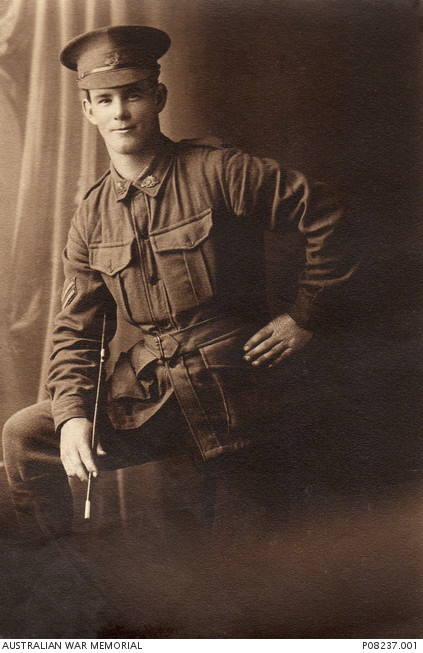Cpl
Arthur Beaumont Goard
Information about birth
|
Date of birth: 24/10/1888 |
|
Place of birth: Murrurundi, Upper Hunter Shire, New South Wales, Australia |
General information
|
Profession: Farmer |
Army information
|
Country: Australia |
|
Force: Australian Imperial Force |
|
Rank: Corporal |
|
Service number: 6744 |
|
Enlistment date: 18/07/1916 |
|
Enlistment place: Sydney, New South Wales, Australia |
|
Units: — Australian Infantry, 2nd Bn. (Last known unit) |
Information about death
|
Date of death: 04/10/1917 |
|
Place of death: Jabber House, Belgium |
|
Cause of death: Killed in action (K.I.A.) |
|
Age: 28 |
Cemetery
|
Aeroplane Cemetery Plot: V Row: A Grave: 7 |
Distinctions and medals 2
|
British War Medal Medal |
|
Victory Medal Medal |
Points of interest 2
| #1 | Place of birth | ||
| #2 | Enlistment place |
My story
Corporal Arthur Beaumont Goard was a 27 year old dairy and pig farmer from Byron Bay, NSW. Arthur was born in 1888 in Murrurundi, NSW to school principal William Samuel and Selina Mary Small and studied agriculture at Hawkesbury College. After enlisting in 1916 he became part of D Company, 2nd Australian Infantry Battalion A.I.F., 1st Australian Brigade, 1st Australian Division.
In the Battle of Passchendaele in 1917 the 2nd Bn. A.I.F. were put in the frontline near Molenaarelsthoek on the night of 30 September / 1 October. Between 1 and 4 October they suffered from several German attacks, very active shelling and artillery barrages. All of the attacks could be repulsed. Resulting in 149 casualties (11 officers and 138 other ranks). According to his Red Cross Wounded and Missing file Cpl. was hit by a shell, killing him instantly in the morning of 4 October. He was buried where he fell (J.4.b.0.0.) near Jabber House. After the war he was reburied at Aeroplane Cemetery where he is still remembered today.
In his will he left his positions and farm to his siblings and parents and also included “50 pounds to the Trustees of the Church of England Broken Head, Byron Bay, such sum to be expended in the erection of a Church of England at Broken Head, Byron Bay”. The land on which the church was build and the lectern and alter were donated by his family.
In the Battle of Passchendaele in 1917 the 2nd Bn. A.I.F. were put in the frontline near Molenaarelsthoek on the night of 30 September / 1 October. Between 1 and 4 October they suffered from several German attacks, very active shelling and artillery barrages. All of the attacks could be repulsed. Resulting in 149 casualties (11 officers and 138 other ranks). According to his Red Cross Wounded and Missing file Cpl. was hit by a shell, killing him instantly in the morning of 4 October. He was buried where he fell (J.4.b.0.0.) near Jabber House. After the war he was reburied at Aeroplane Cemetery where he is still remembered today.
In his will he left his positions and farm to his siblings and parents and also included “50 pounds to the Trustees of the Church of England Broken Head, Byron Bay, such sum to be expended in the erection of a Church of England at Broken Head, Byron Bay”. The land on which the church was build and the lectern and alter were donated by his family.
Sources 8
|
Ancestry https://www.ancestry.com/ Sources used |
|
Article St. Oswald Church Byron Bay https://www.talesfromthegrave.org/post/his-death-created-a-community-place-in-his-home-town?fbclid=IwAR20aA2JHM9SmIAJmPrF1gMp6uz4wWz5l17C4l-61HmNv4k-CctZGCqpQ0Y Sources used |
|
CWGC https://www.cwgc.org/find-records/find-war-dead/casualty-details/449751/ARTHUR%20BEAUMONT%20GOARD/ Sources used |
|
Red Cross Wounded and Missing File https://www.awm.gov.au/advanced-search/people?people_preferred_name=goard&people_service_number=6744&people_unit= Sources used |
|
Service Record https://recordsearch.naa.gov.au/SearchNRetrieve/Interface/DetailsReports/ItemDetail.aspx?Barcode=5129778&isAv=N Sources used |
|
Small Community Fights To Save Its Church https://www.facebook.com/watch/?v=2729472134026031&ref=sharing Sources used |
|
The Long Long Trail https://www.longlongtrail.co.uk/ Sources used |
|
War Diary https://www.awm.gov.au/collection/C1339132 Sources used |
